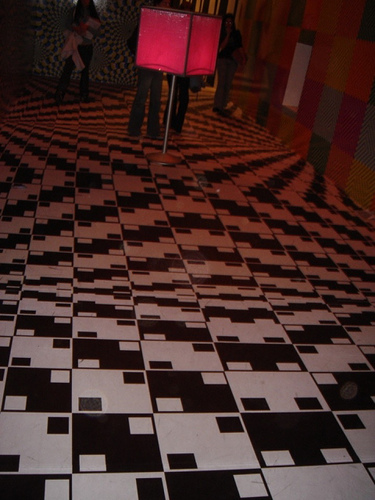February 18, 2009
'a transgeneric mutational agent'

- What is most interesting about Wonky thus far is its trans-generic nature, its relative looseness and inclusiveness to a proper diversity of disparate aesthetics: stretching between Rave, Dubstep, G-Funk, Instrumental Hip Hop, Crunk, Pop, UK Garage, IDM/Electronica, Techno… etc. Moreover it operates in a number of different tempos, (chiefly dubstep’s 138 bpm and hip hop’s slower 90-110bpm) with producers scattered between different continents, and different regimes of consumption (club and home listening). Even further, the very notion of “wonky” itself is a deeply slippery idea. Sometimes it indicates de-quantised drums (as in Flying Lotus, Lukid, and other post Dilla beat-artisans) sometimes pitch-bent synth and bass work (Joker, Starkey, Rustie), sometimes a maddening rush of 8 Bit arpeggios (Zomby, Ikonika, Rustie again). Wonky is not so much a genre unto itself. Instead it operates as a kind of trans-generic mutational agent, spreading seamlessly between bpm species, liquidating textures, distending rhythmical consistency like so much manipulable sonic sticky toffee: All that is solid melts into a new electronic psychedelia, as fluid and mellifluous as the globalised capitalism which spreads it. Wonky in the sense of off-key, out of place, misshapen, breaking through an electronic music environment increasingly characterised by myopic microgenre developments and parodic stylistic affectations, as a set of strategies to be applied to a pre-existing template. In a sense then Wonky detournes pre-existing genres (instrumental hip hop, grime, rave, dubstep etc) corroding the arid grid-like bass kick / snare matrix into something closer to the handmade asymmetrical anti-rhythms of Burial, pushing the shuffled culminating and accelerating sensual textural play towards a surrealist fair ground of Dali-esque percussive affect.
Alex Williams, demonstrating how theory can operate as an intensifier of music. Alex's sumptuous description makes Wonky sound mouthwatering, but ultimately I much prefer his description to the music itself.
Part of my worry is that the problem of formal nostalgia is being sidestepped. There might be not a question of psychological nostalgia in the case of Rustie et al (but even that is difficult to swallow, given the preponderance of videogame analogue in so much Wonky). The problem is that "not dealing explicitly with manipulations or foregroundings of the past (or the processes of memory)" doesn't, of course, mean that you have left the past behind. What you have instead is a music that cleaves to an idea of the 'futuristic', while in fact trading on sounds that are actually now nothing more than well-worn signifiers of the future (ye olde synths and bleeps). (Hauntology faces the failure of the future; Wonky exemplifies it... discuss.) Perhaps Wonky doubles global capitalism all too precisely, in the way that is both about 'mellifluous fluidity' and the minimal manipulation of archaism.
Alex does some ingenious theoretical work to differentiate his defence of Wonky from, on the one hand, standard postmodern accounts of bricolage and, on the other, the D/G-type celebrations of flows and deterritorialization. But it's an open question as to whether the delocalisation brought about by shifts in "technology, lines of communication and influence, and geographical centres" will do anything but gradually lower intensity and innovation levels and increase blandness. Yes, Wonky, like all post-Web 2.0 culture, has moved from the conditions which gave rise to the HCC - but will these new conditions produce something which is anywhere near the equal of HCC? Or will the future just be .... mildly interesting?
Posted by mark at February 18, 2009 05:37 PM | TrackBack